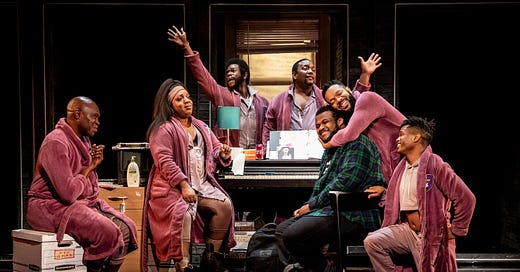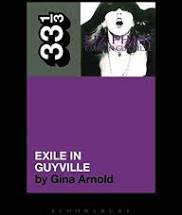It was the last week of the semester, so I took my students to see "A Strange Loop," the Pulitzer Prize winning musical that recently at A.C.T in downtown San Francisco. I would hope that you are now thinking, "Wow, how nice of you, Gina," or perhaps, "Wow, cool beans that your university pays for that!" And you'd be right on both counts. Unfortunately, although the whole class signed up for the field trip, hardly any of them showed up on the night, because...well, because what?
I have no idea. They SAID they had to study, and there may be some readers who are now thinking approvingly, "Oh how nice that they prioritized studying over going to the theater," but to that I am afraid I must strongly disagree. The class in question is called The Rhetoric of Race and the Media, so it's actually really sad that, after a semester's worth of reading texts about how important it is for underrepresented voices to be heard in the arts, they can't see how seeing an award-winning play about a young black man's (successful) struggle to do just that fits into our course content.
I'm not really mad that most of the class didn't come. It's totally unsurprising, and completely in keeping with most students' current inability to match anything they do in class with the real world. But it made me view "A Strange Loop," which I saw a few years ago on Broadway, slightly differently. The first time I saw it I was struck by its originality, its humor, and the way it referred to issues of race - specifically, the notions of white privilege, male fragility, black excellence and black trauma - with such cynicism. This time, I was more struck by it as a commentary on the difficult process of making art. The entire play, which takes place in the protagonist's head, is about him grappling with the impossibility of being original in a world where only the most mechanized and obvious tropes - like those of people like Tyler Perry and Taylor Swift -- sells.
Since I am currently grappling with looming takeover of A.I., both in my classroom and in the world at large, this time around, that aspect of this play was the part that seemed most profound. This semester, I kept getting emails from admin that say things like 'GenAI represents a massive opportunity for our campus and for our students!’ and I just can’t accept that. To me, the fact that A.I. is degrading people's ability to absorb knowledge and is also dehumanizing, especially in the realm of anything artistic, humanistic, or language-based, shouldn't even be up for debate -- just like the facts that lethal weapons should be regulated and women should have reproductive rights shouldn't be up for debate.
It's so weird to me that they are.
****
As mentioned, "A Strange Loop" is about the inner thoughts of a young black man who is an usher at the Broadway production of The Lion King, as he attempts to write a Broadway musical. Ostensibly, it takes place between the acts. He is an MFA student at NYC who is having trouble completing his project, which is, as he tells his friends and family, "a play within a play within a play." At this remark, they all stare at him uncomprehendingly, or else suggest that he write something a lot simpler: for preference, a gospel play or even better, a corny-ass money-maker about idealized black family life for the producer Tyler Perry. (Because, as his mother keeps telling him, 'Tyler Perry writes Real Life!")
But Usher, as he is called in the play, doesn't want to compromise his weird vision. He wants to write a play within a play within a play, based on the work of Douglas Hofstatdter and Liz Phair. This causes difficulties because he is also being pressured to write about the Black Experience. But he'd rather be free to loose what he calls his 'inner white girl,' because as he sadly sings, white girls have permission to say and do anything they want, while black boys, do not. And attempting to express himself in white girl terms (and musical idioms) is messing with everyone's head.
In short, the play is about the difficulties of expressing your true self - in prose, in music, in plays, or whatever. And Usher's struggle isn't just that it's hard to live in a fat queer black body; it's also trying to make room for the articulation of that struggle in the media, which requires that we fit our personas into a stereotypical identity, a process which for some reason many people comply with.
The bulk of the play is an emotionally fraught explanation of what its like growing up gay in a really religious household, so the fact that I could relate to it would seem on the surface to be a little weird. But come to think of it, most of us are not tortured Russian intellectual criminals, meth-makers or Mafiosi, and yet we get something out of "Crime and Punishment" "Breaking Bad" and "The Sopranos." Indeed, if you're female, you've spent most of your life reading, viewing, and listening to the mental torment of white men, without much giving it any pushback in one's own mind about how far it is from one's experience...
Well, more or less. Less, I guess, or at least since I heard "Exile In Guyville," the 1995 opus by the artist Liz Phair, which deals exactly in this subject matter, only from a very different manner. "Exile In Guyville" is a detailed conversation with the Rolling Stones record "Exile On Main Street," and, in homage, every song in "A Strange Loop" is a response to "Exile in Guyville." "Exile in Guyville" also describes what it's like to be a white girl trying to be a rocker in an all male world, and "A Strange Loop" does the same thing, only transposed to describing blackness, queerness, and musical theater.
Also, just as Liz has a love/hate relationship with both the Rolling Stones and Urge Overkill (the band that coined the term Guyville), Jackson has a similar thing going on with both musical theater, and with Tyler Perry. One of the play's highlights is a play within a play where he spoofs Perry's work quite thoroughly...just as Liz goofed on "Exile On Main Street." That's the Strange Loop. Get it?
"A Strange Loop" is, as this description indicates, very high concept, but as it rolled out before me I just sat there in awe, thinking about what a great trick that was: to respond to Liz responding to the Stones, to expand the experience of being marginalized and excluded, to write an entire play which takes place in the main character's head as he ushers during the intermission of the "Lion King," and for the real ending - real success -- to take place not in between the pages of the play, or the album, but years later, as we, the audience, watch it unfold…
Fantastic, right? So rewarding! And so rewarded. It's astonishing that people even get it at all, to be honest, much less heap praise and prizes upon it, but it makes me so happy that they do, because it feels like one last bulwark against the tide of A.I., the embrace of which no one seems willing to admit out loud is a negative thing.






just the best opinion ever
Thanks for this analysis. I need to read the book and lyrics. There is so much going on on stage, I think I missed the essence of what the playwright was trying to say. Also, I want to understand better why the students didn't want to see the musical. I think musicals get a bad rap because of old constructs, i.e., of what people "think" is a musical, and many get turned off without giving them a chance.